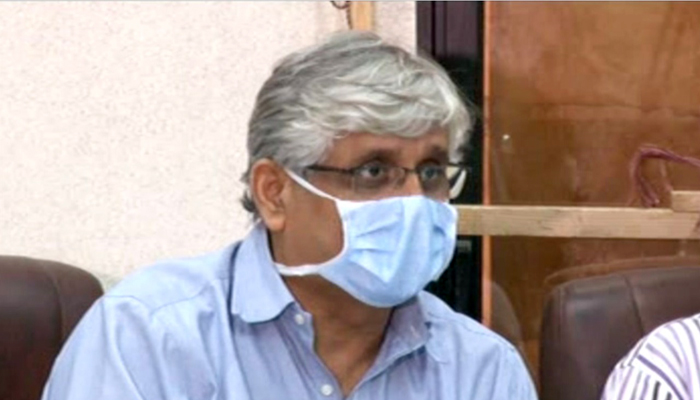'We are running out of beds': Doctors plead to govt to enforce stricter coronavirus lockdown
April 22, 2020

A group of Karachi's leading doctors, belonging to the Pakistan Medical Association on Wednesday painted a sobering picture of the on-the-ground realities faced by frontline workers in the fight against the coronavirus.
Urging the government and religious leaders to continue to abide by recommended precautions instead of easing restrictions, they warned a point will otherwise come when they will have to choose between one of two patients to save.
Addressing the emergency briefing, Dr Saad Niaz. a gastroenterologist at the Dow University of Health Sciences, said that it was important to remember the outbreak is foremost a health issue.
"This is a medical problem which [of course] has its resulting economic and social effects. But we need to understand that this is nonetheless primarily a medical issue."
"From April 16 to April 21, we went from 6,772 patients to 9,464 patients, which is a near 40% increase [...] an increase by 2,692 patients. If you count patients from February 25, we took time in reaching 2,000 patients," he said.
Dr Niaz regretted that there was unfortunately the impression that this is not as serious an issue in our country as in other countries. "The reason for that is our testing capacity, which is an issue that will remain," he said.
Warning against such impressions, he said: "This is not true at all. All of us doctors think the numbers are higher and will continue to rise."
"Some people thought that because we live in the sub-continent, [coronavirus] won't affect us and if it does affect us, it won't be as severe."
"We have not even peaked yet. So it is very important to bust all these myths," said Dr Niaz.
"If we hadn't placed the country under a lockdown, then the situation would have been different. Similarly, if we don't act now, two weeks down the line, the situation will be very different."
"The wards are all already 80% saturated. And in Pakistan's case, there are more patients who are under 60 years of age," he said.
Dr Niaz also drew attention to the fact that more and more doctors are getting affected, with as many as 162 who had already fallen prey to the disease from Sindh.
"We are already very under-equipped when it comes to our healthcare. We don't have what it takes to fight this," he said, citing lack of COVID-19 specific facilities and personal protection equipment for doctors throughout the country.
"We will have great difficulty in the coming days such as refusal to admit patients because of no beds," he said.
"The severity [of the outbreak] is much more than what we think already. All experts think this will blow out of control over the next two to four weeks. And with non-COVID patients coming in, the hospitals will have to be closed [to more patients]."
The DUHS doctor explained that the country's current capacity had so far sustained the volume of patients "because due to a lockdown in place, they were only trickling in".
"Projected figures stand at 70,000 and if even 10% of those are serious cases, we don't even have the capacity to accommodate those. There are no ventilators.
"Our only option is to be aggressive with precautions. We don't have the skill or capacity to combat something of the scale it could reach.
"Whatever we have done so far will have to be continued," he stressed.
"What I fear is that we start treating patients on the road. We will be deciding between a 35-year-old and 55-year-old and giving preference to the younger one."
Doctors angry, stressed out
Dr Abdul Bari, who is the CEO of Indus Hospital, said that after the lockdown was eased on April 14, doctors had vehemently protested against the decision.
"We thought that a lockdown of at least two incubation periods would take place and that would show some positive signs," he said.
He said that the arrival of Ramazan, which had prompted the government to review the measures taken and subsequently ease restrictions, had resulted in a surge in cases.
"This led to great anger and stress in the doctor community as they are the experts in this situation [and must be heard]," said Bari, adding: "All of Karachi's medical facilities are now almost full to the brim with patients."
Another doctor regretted the lockdown had been scaled back.
"The Sindh government had taken very good measures in the beginning.
"That has turned into a joke now. There are countless vehicles on the road [...] We have gathered here to tell you we have no space in hospitals anymore," said the doctor.
He said the government had made a "huge blunder", as had the religious scholars, in agreeing on an easing of restrictions.











